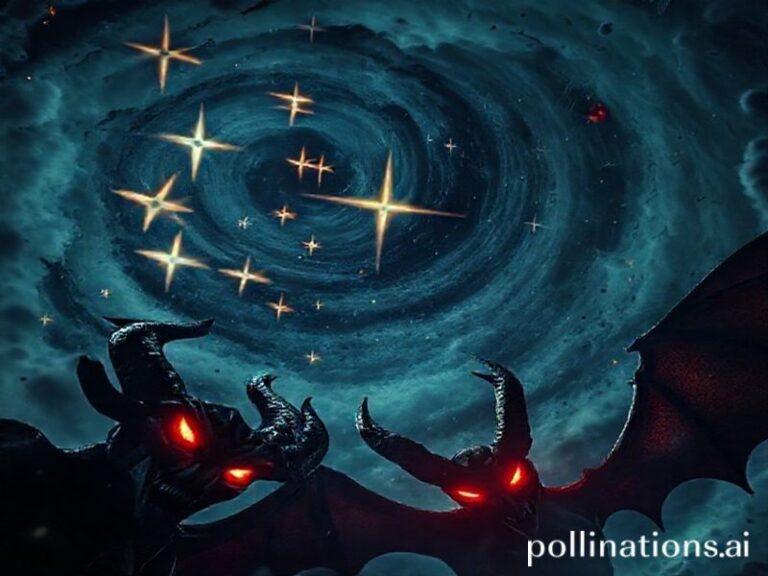Global Valkyrie Boom: How the Afterlife Went Multinational and Started Accepting Crypto
The Valkyries Are Back, and They’ve Got Global Entry
By Our Correspondent Somewhere Over the Mid-Atlantic
NORWAY—On paper, the valkyries were always a Nordic HR department for the afterlife: winged middle-managers who skimmed battlefields, filed the résumés of the freshly dead, and escorted top talent to Valhalla’s open-bar networking lounge. In practice, of course, they were the original multinational recruiting firm—outsourcing death long before Silicon Valley made it an app.
Fast-forward twelve centuries and the brand is enjoying a surprise relaunch. From Reykjavík to Riyadh, governments, venture-capitalists, and arms dealers alike have discovered that nothing sells eternal glory quite like a retooled myth. The new valkyries don’t ride eight-legged horses; they ride algorithmic drones, shareholder spreadsheets, and the faint hope that somebody, somewhere, still believes dying for a flag beats dying for rent.
Consider the export numbers. Sweden’s SAAB recently unveiled “Project Sigrún,” an AI-enabled targeting system named after the chooser of the slain, which politely informs enemy combatants—via push notification—that they have been pre-approved for paradise. The marketing brochure, equal parts IKEA manual and Edda, promises “a seamless transition from kinetic engagement to post-corporeal onboarding.” Meanwhile, in Seoul, a K-pop agency has trademarked “V-kyries™,” a nine-member girl group whose choreography involves synchronized drone strikes on a green-screen steppe. Tickets to their world tour come with optional life-insurance bundles; the fine print cheerfully notes that policyholders who perish in the mosh pit receive premium seating in the next world.
The Chinese government, never one to miss a trend, has rolled out the “Fēngtiān Program,” a cloud-based afterlife service that ranks citizens according to patriotic valor. High scorers are greeted at death by holographic valkyries who look suspiciously like the same influencers promoting lipstick on TikTok ten minutes earlier. Critics call it gamified reincarnation; Beijing calls it “soft power with hard consequences.”
Even humanitarian circles are in on the joke—though they insist it’s not a joke. Médecins Sans Frontières now deploys “White Valkyries,” med-evac teams whose helicopters are painted matte ivory for that tasteful, salvation-chic aesthetic. Their press releases lament the “weaponization of myth,” while simultaneously crowdfunding off the same imagery. One spokesperson, speaking over the thud of rotor blades outside Mosul, admitted between bites of an energy bar, “Irony died somewhere around Aleppo, but branding is forever.”
Financial markets have responded with predictable bloodlust. Futures in post-mortem real-estate—cryptocurrency plots on the Ethereum-based “Valhallanet”—spiked 400% after a16z led a Series B round valuing the platform at three billion dollars. The prospectus features a pixelated valkyrie in a Patagonia vest, captioned: “Disrupting mortality since YC S-24.”
All of which raises the question: why this myth, why now? Anthropologists point to rising global inequality, climate dread, and the general sense that late-stage capitalism has become a Viking raid without the cool boats. When the present looks apocalyptic, the past sells like artisanal mead. Political scientists note that every empire eventually mints its own psychopomp; Washington had eagles, Rome had triumphal arches, and apparently we get NFT shield-maidens who accept Visa.
And yet, beneath the branded wings and SaaS slogans, the original job description remains depressingly intact: separate the useful dead from the inconvenient dead, then make the survivors feel grateful. The uniforms change, the battlefields move—from Flanders to Facebook—but the punchline is eternal. We still want someone divine to tell us our extinction has meaning, preferably with a loyalty program.
So the next time you see a headline about “precision-guided valkyries” or catch a pop anthem sampling Wagner with trap beats, pour one out—for yourself. The choosers of the slain have gone global, and they’re taking applications. Requirements include a valid passport, a flexible conscience, and the willingness to relocate permanently. Benefits include endless mead, questionable glory, and the faint possibility that whoever ends up selecting you isn’t a bored billionaire with a drone joystick.
Skål, humanity. Your performance review is scheduled for Ragnarok, and HR is already sharpening the clipboard.







